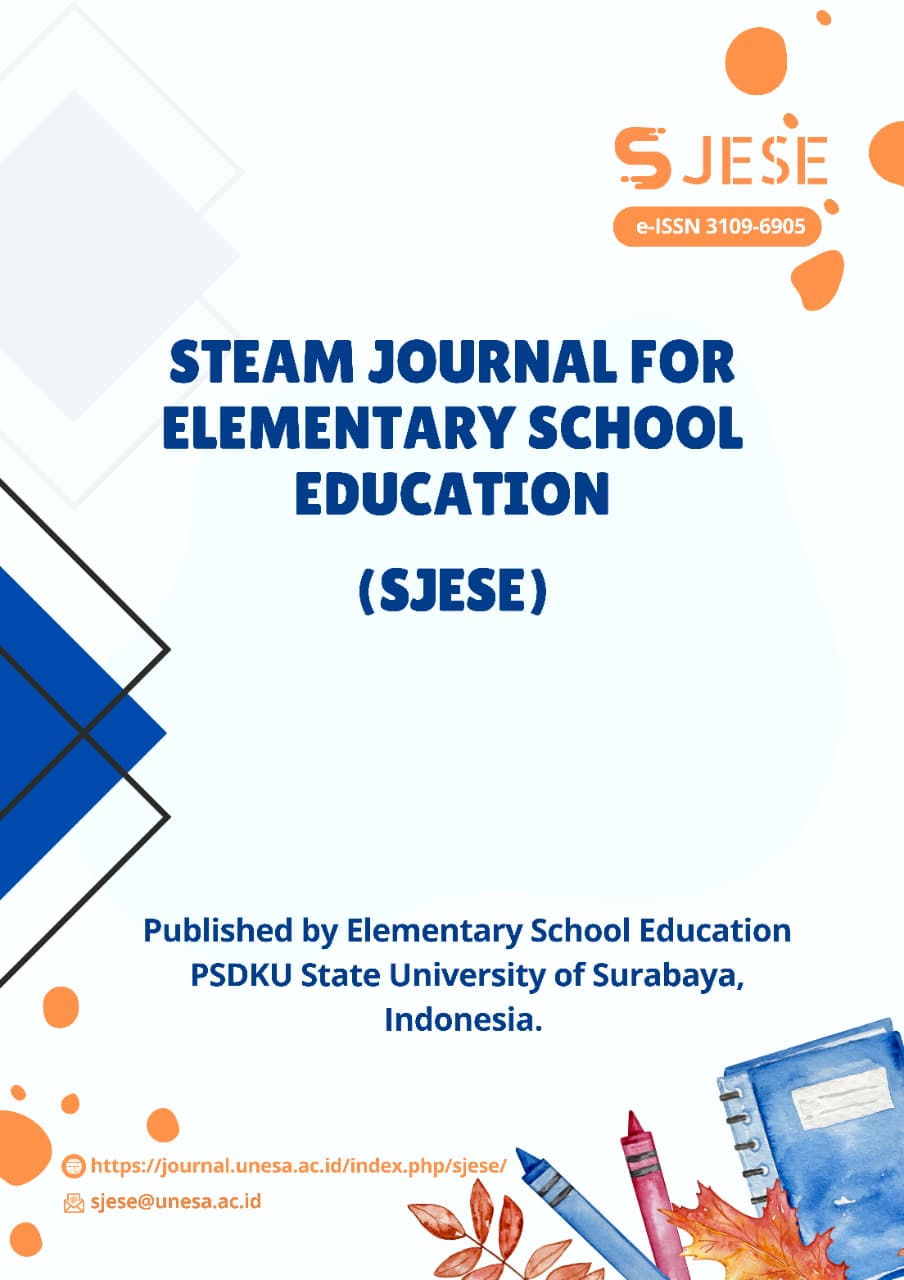Exploring the Integration of Artificial Intelligence in Primary Education: A Systematic Literature Review (2020–2024)
DOI:
https://doi.org/10.26740/sjese.1.02.2025.4Keywords:
Artificial Intelligence, Primary Education, Systematic Literature Review, Educational TechnologyAbstract
Artificial intelligence (AI) is increasingly transforming primary education by enabling adaptive, personalized, and interactive learning. This study presents a systematic literature review (SLR) of 54 Scopus-indexed articles published between 2020 and 2024 to explore trends, applications, benefits, and challenges of AI integration in primary education. The review followed PRISMA 2020 guidelines and combined bibliometric and thematic analyses. Biblioshiny was applied to examine publication trends and contributing countries, while VOSviewer visualized keyword co-occurrence and thematic clusters. Results indicate steady growth in research, with China, the United States, and Europe leading contributions. Nine categories of AI applications were identified, particularly machine learning, deep learning, and natural language processing. Reported benefits include personalization, improved engagement, inclusive education support, teacher efficiency, and digital literacy development. However, significant challenges remain, such as limited infrastructure, insufficient teacher readiness, financial constraints, and concerns over children’s data privacy. The study concludes that while AI holds strong potential to enhance primary education, successful implementation depends on ecosystem readiness, equitable access, and ethical safeguards. This review contributes by mapping global research trends, consolidating fragmented evidence, and offering practical insights for educators, policymakers, and researchers.
References
Abar, C. A. A. P., Dos Santos Dos Santos, J. M., & de Almeida, M. V. (2021). Computational Thinking in Elementary School in the Age of Artificial Intelligence: Where is the Teacher? Acta Scientiae, 23(6), 270–299. https://doi.org/10.17648/ACTA.SCIENTIAE.6869
Abdulmunem, R. A. (2023). Artificial intelligence in education. In Comparative Research on Diversity in Virtual Learning: Eastern vs. Western Perspectives (pp. 241–255). IGI Global. https://doi.org/10.4018/978-1-6684-3595-3.ch012
Akintolu, M., & Oyekunle, A. A. (2025). DATA-DRIVEN DECISION-MAKING: UTILISING AI-POWERED LEARNING ANALYTICS TO MAKE INFORMED PRIMARY EDUCATORS’ DECISIONS. Journal of Educators Online, 22(3). https://doi.org/10.9743/JEO.2025.22.3.1
Alsohaimi, M., Albahiri, M. H., & Alhaj, A. A. M. (2025). Addressing and Managing Artificial Intelligence (AI) Challenges and Opportunities in Elementary Education in Saudi Arabia: An In-Depth Consideration. Educational Process: International Journal, 17. https://doi.org/10.22521/edupij.2025.17.324
Aslan, S., Durham, L. M., Alyuz, N., Okur, E., Sharma, S., Savur, C., & Nachman, L. (2024). Immersive multi-modal pedagogical conversational artificial intelligence for early childhood education: An exploratory case study in the wild. Computers and Education: Artificial Intelligence, 6. https://doi.org/10.1016/j.caeai.2024.100220
Benvenuti, M., Cangelosi, A., Weinberger, A., Mazzoni, E., Benassi, M., Barbaresi, M., & Orsoni, M. (2023). Artificial intelligence and human behavioral development: A perspective on new skills and competences acquisition for the educational context. Computers in Human Behavior, 148. https://doi.org/10.1016/j.chb.2023.107903
Braun, V., & Clarke, V. (2006). Using thematic analysis in psychology. Qualitative Research in Psychology, 3(2), 77–101. https://doi.org/10.1191/1478088706qp063oa
Butler, L., & Starkey, L. (2024). OK Google, help me learn: an exploratory study of voice-activated artificial intelligence in the classroom. Technology, Pedagogy and Education, 33(2), 135–148. https://doi.org/10.1080/1475939X.2024.2311779
Dai, Y., Liu, A., Qin, J., Guo, Y., Jong, M. S. Y., Chai, C. S., & Lin, Z. (2023). Collaborative construction of artificial intelligence curriculum in primary schools. Journal of Engineering Education, 112(1), 23–42. https://doi.org/10.1002/jee.20503
Darmawan, E., Rahman, T. K. A., & Thamrin, N. R. (2024). Evaluating Readiness and Acceptance of Artificial Intelligence Adoption Among Elementary School Teachers. Jurnal Online Informatika, 9(2), 228–237. https://doi.org/10.15575/join.v9i2.1385
Elantheraiyan, P., Priya, K. M., Gamadia, D. R., Abdulhasan, M. M., Abood, B. S. Z., & Al-Khalidi, A. (2024). Ethical Design and Implementation of AI in the Field of Learning and Education: Symmetry Learning Technique. 2024 4th International Conference on Advance Computing and Innovative Technologies in Engineering, ICACITE 2024, 1144–1148. https://doi.org/10.1109/ICACITE60783.2024.10616584
Faria, D. R., Bird, J. J., Daquana, C., Kobylarz, J., & Ayrosa, P. P. S. (2020). Towards ai-based interactive game intervention to monitor concentration levels in children with attention deficit. International Journal of Information and Education Technology, 10(9), 641–648. https://doi.org/10.18178/ijiet.2020.10.9.1437
Fundi, M., Sanusi, I. T., Oyelere, S. S., & Ayere, M. (2024). Advancing AI education: Assessing Kenyan in-service teachers’ preparedness for integrating artificial intelligence in competence-based curriculum. Computers in Human Behavior Reports, 14. https://doi.org/10.1016/j.chbr.2024.100412
Galindo-Domínguez, H., Delgado, N., Campo, L., & Losada, D. (2024). Relationship between teachers’ digital competence and attitudes towards artificial intelligence in education. International Journal of Educational Research, 126. https://doi.org/10.1016/j.ijer.2024.102381
Horvers, A., Kooi, R., Knoop-van Campen, C. A. N., Dijkstra, R., Baars, M., & Molenaar, I. (2024). How does co-regulation with Adaptive Learning Technologies affect primary school students’ goal-setting, regulation of practice behavior and learning outcomes? Frontiers in Education, 9. https://doi.org/10.3389/feduc.2024.1435483
Hughes, C. E., Dieker, L. A., Glavey, E. M., Hines, R. A., Wilkins, I., Ingraham, K., Bukaty, C. A., Ali, K., Shah, S., Murphy, J., & Taylor, M. S. (2022). RAISE: Robotics & AI to improve STEM and social skills for elementary school students. Frontiers in Virtual Reality, 3. https://doi.org/10.3389/frvir.2022.968312
Jang, J., Jeon, J., & Jung, S. K. (2022). Development of STEM-Based AI Education Program for Sustainable Improvement of Elementary Learners. Sustainability (Switzerland), 14(22). https://doi.org/10.3390/su142215178
Joshi, S., & Ramnath, R. (2025). Harnessing Artificial Intelligence to Transform Primary Education: Applications, Challenges, and Future Directions. In R. C. Geibel & S. Machavariani (Eds.), Springer Proceedings in Business and Economics (pp. 515–528). Springer Nature. https://doi.org/10.1007/978-3-031-88052-0_41
Kitchenham, B., & Brereton, P. (2013). A systematic review of systematic review process research in software engineering. Information and Software Technology, 55(12), 2049–2075. https://doi.org/10.1016/j.infsof.2013.07.010
Laukyte, M. (2024). Artificial intelligence in education: Interests of and benefits for children, teachers and schools. In Human Right to Education in the Age of Innovations and Smart Technologies (pp. 17–35). Peter Lang AG. https://www.scopus.com/inward/record.uri?eid=2-s2.0-85198089590&partnerID=40&md5=6ee1d6d83ee4f3eedd8d608e387e8be4
Li, M., & Noori, A. Q. (2024). Exploring the nexus of attitude, contextual factors, and AI utilization intentions: A PLS-SEM analysis among primary mathematics teachers in China. Asian Journal for Mathematics Education, 3(3), 289–311. https://doi.org/10.1177/27527263241269060
Lin, P. Y., Chai, C. S., Jong, M. S. Y., Dai, Y., Guo, Y., & Qin, J. (2021). Modeling the structural relationship among primary students’ motivation to learn artificial intelligence. Computers and Education: Artificial Intelligence, 2. https://doi.org/10.1016/j.caeai.2020.100006
Mertala, P., Fagerlund, J., & Calderon, O. (2022). Finnish 5th and 6th grade students’ pre-instructional conceptions of artificial intelligence (AI) and their implications for AI literacy education. Computers and Education: Artificial Intelligence, 3. https://doi.org/10.1016/j.caeai.2022.100095
Mohebi, L. (2025). A Qualitative Study on the Integration of AI in Education: Perceptions, Challenges, and Opportunities Among Selective In-Service and Pre-service Teachers in the UAE. In Lecture Notes in Educational Technology: Vol. Part F312 (pp. 113–126). Springer Science and Business Media Deutschland GmbH. https://doi.org/10.1007/978-981-96-4952-5_8
Moon, H., Go, H., Lee, Y., & Kim, S.-W. (2024). Investigating Factors in Artificial Intelligence Literacy for Korean Elementary School Students. 14(4).
Moon, W., Kim, B., Kim, B., & Kim, J. (2024). Development of Artificial Intelligence Education Programs Centered on Deep Learning Principles. In Nanotechnology Perceptions (Vol. 20, Issue S2).
Page, M. J., McKenzie, J. E., Bossuyt, P. M., Boutron, I., Hoffmann, T. C., Mulrow, C. D., Shamseer, L., Tetzlaff, J. M., Akl, E. A., Brennan, S. E., Chou, R., Glanville, J., Grimshaw, J. M., Hróbjartsson, A., Lalu, M. M., Li, T., Loder, E. W., Mayo-Wilson, E., McDonald, S., … Moher, D. (2021). The PRISMA 2020 statement: an updated guideline for reporting systematic reviews. BMJ, n71. https://doi.org/10.1136/bmj.n71
Pont-Niclòs, I., Echegoyen-Sanz, Y., Orozco-Gómez, P., & Martín-Expeleta, A. (2024). Creativity and artificial intelligence: A study with prospective teachers. Digital Education Review, 45, 91–97. https://doi.org/10.1344/der.2024.45.91-97
Pu, S., Ahmad, N. A., Khambari, M. N. M., Yap, N. K., & Ahrari, S. (2021). Improvement of Pre-Service Teachers’ Practical Knowledge and Motivation about Artificial Intelligence through a Servicelearning-based Module in Guizhou, China: A QuasiExperimental Study. Asian Journal of University Education, 17(3), 203–219. https://doi.org/10.24191/ajue.v17i3.14499
Rajput, R. (2025). Overcoming Barriers to AI Implementation in the Classroom: A Roadmap for Educational Transformation. In Navigating Barriers to AI Implementation in the Classroom (pp. 401–436). IGI Global. https://doi.org/10.4018/979-8-3373-1827-1.ch015
Relmasira, S. C., Lai, Y. C., & Donaldson, J. P. (2023). Fostering AI Literacy in Elementary Science, Technology, Engineering, Art, and Mathematics (STEAM) Education in the Age of Generative AI. Sustainability (Switzerland), 15(18). https://doi.org/10.3390/su151813595
Rumbelow, M., & Coles, A. (2024). The Promise of AI Object-Recognition in Learning Mathematics: An Explorative Study of 6-Year-Old Children’s Interactions with Cuisenaire Rods and the Blockplay.ai App. Education Sciences, 14(6). https://doi.org/10.3390/educsci14060591
Sabharwal, D., & Mitra, A. (2025). Impact of AI on Student Learning and Teacher Outcomes in Education 5.0. In Impacts of AI on Students and Teachers in Education 5.0 (pp. 293–316). IGI Global. https://doi.org/10.4018/979-8-3693-8191-5.ch012
Shalileh, S., Ignatov, D., Lopukhina, A., & Dragoy, O. (2023). Identifying dyslexia in school pupils from eye movement and demographic data using artificial intelligence. PLoS ONE, 18(11 November). https://doi.org/10.1371/journal.pone.0292047
Tabuenca, B., Uche-Soria, M., Greller, W., Hernández-Leo, D., Balcells-Falgueras, P., Gloor, P., & Garbajosa, J. (2024). Greening smart learning environments with Artificial Intelligence of Things. Internet of Things, 25, 101051. https://doi.org/10.1016/j.iot.2023.101051
Tian, X., Zhao, J., & Nguyen, K. T. (2022). Practical Research on Primary Mathematics Teaching Based on Deep Learning. Scientific Programming, 2022. https://doi.org/10.1155/2022/7899180
Uğraş, H., Uğraş, M., Papadakis, S., & Kalogiannakis, M. (2024). ChatGPT-Supported Education in Primary Schools: The Potential of ChatGPT for Sustainable Practices. Sustainability (Switzerland), 16(22). https://doi.org/10.3390/su16229855
UNESCO. (2023). Global Education Monitoring Report 2023: Technology in education: A tool on whose terms? GEM Report UNESCO. https://doi.org/10.54676/UZQV8501
Villegas-Ch, W., Garcia-Ortiz, J., & Sanchez-Viteri, S. (2024). Optimizing Writing Skills in Children Using a Real-Time Feedback System Based on Machine Learning. IEEE Access, 12, 164634–164651. https://doi.org/10.1109/ACCESS.2024.3492974
Wardat, Y., Tashtoush, M. A., AlAli, R., & Saleh, S. (2024). Artificial Intelligence in Education: Mathematics Teachers’ Perspectives, Practices and Challenges. Iraqi Journal for Computer Science and Mathematics, 5(1), 60–77. https://doi.org/10.52866/ijcsm.2024.05.01.004
Wong, G. K. W., Jian, S., & Cheung, H. Y. (2024). Engaging children in developing algorithmic thinking and debugging skills in primary schools: A mixed-methods multiple case study. Education and Information Technologies, 29(13), 16205–16254. https://doi.org/10.1007/s10639-024-12448-x
Wong, W. L. (2025). The Feasibility of Using Artificial Intelligence to Explore Ecological Balance in Primary Education. In S. C. KONG, H. S. U. T. C, & J. ZHAO (Eds.), Proceedings of International Conference on Computational Thinking Education (pp. 175–177). The Education University of Hong Kong. https://www.scopus.com/inward/record.uri?eid=2-s2.0-105011827474&partnerID=40&md5=1d586fd697a2930749a0eb3075141a8c
Wu, C. H., Liu, C. H., & Huang, Y. M. (2022). The exploration of continuous learning intention in STEAM education through attitude, motivation, and cognitive load. International Journal of STEM Education, 9(1). https://doi.org/10.1186/s40594-022-00346-y
Wu, S. Y., & Yang, K. K. (2022). The Effectiveness of Teacher Support for Students’ Learning of Artificial Intelligence Popular Science Activities. Frontiers in Psychology, 13. https://doi.org/10.3389/fpsyg.2022.868623
Yim, I. H. Y. (2024). Artificial intelligence literacy in primary education: An arts-based approach to overcoming age and gender barriers. Computers and Education: Artificial Intelligence, 7. https://doi.org/10.1016/j.caeai.2024.100321
Yu, Y., Han, L., Du, X., & Yu, J. (2022). An Oral English Evaluation Model Using Artificial Intelligence Method. Mobile Information Systems, 2022. https://doi.org/10.1155/2022/3998886
Downloads
Published
Issue
Section
 Abstract views: 594
,
Abstract views: 594
, PDF Downloads: 997
PDF Downloads: 997









